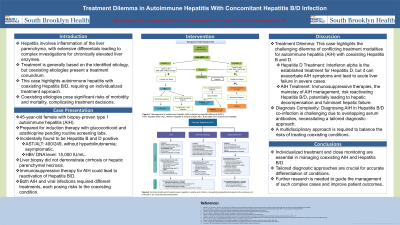Sunday Poster Session
Category: Liver
P1378 - Treatment Dilemma in Autoimmune Hepatitis With Concomitant Hepatitis B/D Infection
Sunday, October 27, 2024
3:30 PM - 7:00 PM ET
Location: Exhibit Hall E

Has Audio

Akil Olliverrie, MD
NYC Health + Hospitals/South Brooklyn Health
Brooklyn, NY
Presenting Author(s)
Akil Olliverrie, MD, Ethan Abrishamian, DO, Syed Karim, DO, John Trillo, MD
NYC Health + Hospitals/South Brooklyn Health, Brooklyn, NY
Introduction: Hepatitis describes an inflammatory process involving the liver parenchyma. The differentials are extensive, thus leading to expensive and lengthy investigations for chronically elevated hepatic chemistries. Treatment modalities are usually tailored to the identified etiology, however
when these etiologies co-exist, we encounter a treatment conundrum. We highlight one such case of Autoimmune hepatitis with coexisting Hep B/D, where an individualized treatment approach has significant morbidity and mortality to the coexisting etiology.
Case Description/Methods: A 45 year old female with biopsy proven type 1 AIH who was being prepared for induction therapy with glucocorticoid and azathiaprine pending routine screening labs prior to commencement of therapy. She was incidentally found to be hepatitis B/D positive . At which time her AST/ALT 400/249 without hyperbilirubinemia and asymptomatic. HBV DNA level was found to be 15000. Biopsy previously done for AIH diagnosis did not demonstrate cirrhosis or hepatic parenchymal necrosis. In this setting patient may have been a candidate for observation but given her coexisting AIH and use of immunosurpression therapy, it posed a great challenge in treatment as either treatment can result in worsening of concomittent infection.
Discussion: Our case highlights an intriguing dilemma of conflicting treatment modalities. Interferon alpha is the well-established treatment option for Hepatitis D, however in patients with AIH it can precipitate symptom exacerbation and in severe cases, acute liver failure. Conversely, immunosuppressive therapies are the mainstay of treatment for AIH, however it can result in reactivation of Hep B/D with hepatic decompensation and fulminant hepatic failure. This dilemma requires clinical experience and a multidisciplinary approach. A key point to note; clinching the diagnosis of AIH by serological markers in the setting of Hep B/D coinfection is controversial, since various serum antibodies linked to AIH that lack specificity, can also be present in viral hepatitis. Therefore, a tailored diagnostic approach should be considered in this disease conundrum. This case highlights the need for further research in these clinical settings.
Disclosures:
Akil Olliverrie, MD, Ethan Abrishamian, DO, Syed Karim, DO, John Trillo, MD. P1378 - Treatment Dilemma in Autoimmune Hepatitis With Concomitant Hepatitis B/D Infection, ACG 2024 Annual Scientific Meeting Abstracts. Philadelphia, PA: American College of Gastroenterology.
NYC Health + Hospitals/South Brooklyn Health, Brooklyn, NY
Introduction: Hepatitis describes an inflammatory process involving the liver parenchyma. The differentials are extensive, thus leading to expensive and lengthy investigations for chronically elevated hepatic chemistries. Treatment modalities are usually tailored to the identified etiology, however
when these etiologies co-exist, we encounter a treatment conundrum. We highlight one such case of Autoimmune hepatitis with coexisting Hep B/D, where an individualized treatment approach has significant morbidity and mortality to the coexisting etiology.
Case Description/Methods: A 45 year old female with biopsy proven type 1 AIH who was being prepared for induction therapy with glucocorticoid and azathiaprine pending routine screening labs prior to commencement of therapy. She was incidentally found to be hepatitis B/D positive . At which time her AST/ALT 400/249 without hyperbilirubinemia and asymptomatic. HBV DNA level was found to be 15000. Biopsy previously done for AIH diagnosis did not demonstrate cirrhosis or hepatic parenchymal necrosis. In this setting patient may have been a candidate for observation but given her coexisting AIH and use of immunosurpression therapy, it posed a great challenge in treatment as either treatment can result in worsening of concomittent infection.
Discussion: Our case highlights an intriguing dilemma of conflicting treatment modalities. Interferon alpha is the well-established treatment option for Hepatitis D, however in patients with AIH it can precipitate symptom exacerbation and in severe cases, acute liver failure. Conversely, immunosuppressive therapies are the mainstay of treatment for AIH, however it can result in reactivation of Hep B/D with hepatic decompensation and fulminant hepatic failure. This dilemma requires clinical experience and a multidisciplinary approach. A key point to note; clinching the diagnosis of AIH by serological markers in the setting of Hep B/D coinfection is controversial, since various serum antibodies linked to AIH that lack specificity, can also be present in viral hepatitis. Therefore, a tailored diagnostic approach should be considered in this disease conundrum. This case highlights the need for further research in these clinical settings.
Disclosures:
Akil Olliverrie indicated no relevant financial relationships.
Ethan Abrishamian indicated no relevant financial relationships.
Syed Karim indicated no relevant financial relationships.
John Trillo indicated no relevant financial relationships.
Akil Olliverrie, MD, Ethan Abrishamian, DO, Syed Karim, DO, John Trillo, MD. P1378 - Treatment Dilemma in Autoimmune Hepatitis With Concomitant Hepatitis B/D Infection, ACG 2024 Annual Scientific Meeting Abstracts. Philadelphia, PA: American College of Gastroenterology.
